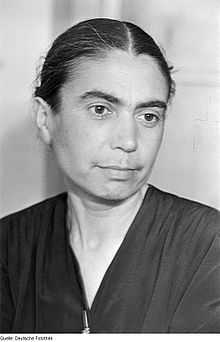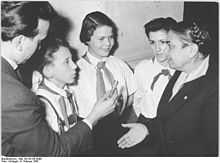Hilde Benjamin
| Hilde Benjamin | |
|---|---|
 | |
| Hilde Benjamin (ca. 1947) | |
| Personal details | |
| Born | Hilde Lange 5 February 1902 Bernburg, Saxony-Anhalt, Germany |
| Died | 18 April 1989 Berlin, Germany |
| Nationality | German |
| Political party | Communist Party (KPD) Socialist Unity Party of Germany (SED) |
| Occupation | Lawyer Politician Judge |


Hilde Benjamin (née Lange, February 5, 1902 – April 18, 1989) was an East German judge and Minister of Justice. She is best known for presiding over a series of political show trials in the 1950s.
Life
Childhood and education
Hilde Lange was born in Bernburg, Anhalt, and grew up in Berlin, the daughter of the engineer Heinz Lange and his wife, Adele.[1] Growing up in a religious and culturally inclined family awakened in her an early interest in classical music and literature which would stay with her throughout her life.
In 1921 she successfully completed her school career at the Fichtenberg High School in Steglitz on the south side of Berlin.
She was among the first women to study law in Germany, which she did at Berlin, Heidelberg, and Hamburg from 1921 to 1924.
Politics and early career
Afterwards, she worked as a practicing attorney in Berlin-Wedding for the Rote Hilfe, a Communist aid organization. In 1926 she married the medical doctor, Georg Benjamin, the brother of writer Walter Benjamin and of her friend, the academic Dora Benjamin. Georg and Hilde's son, Michael was born at the end of 1932.
In 1926 she quit the moderate left-wing SPD and in 1927 joined her husband in the Communist Party. Because she was Jewish she was forbidden to practice law after 1933. Briefly jobless, with her husband removed to a concentration camp (from which, on this occasion, he was released later in the year) directly after the Reichstag fire, she returned for a time to live with her parents along with her small son: she then obtained a position providing legal advice for the Soviet trade association in Berlin. During World War II, she was forced to work in a factory from 1939-45. Her Jewish husband was killed at the KZ Mauthausen in 1942.
Post war in the German Democratic Republic
After the war, she joined the Socialist Unity Party of Germany (SED) in 1946 and was vice president of the Supreme Court of the German Democratic Republic (GDR) from 1949 to 1953. In that capacity, she assisted with the Waldheim Trials and presided over a series of show trials against political undesirables, such as against the Burianek group and Jehovah's Witnesses. Her frequent death sentences earned her the popular sobriquets "The Red Guillotine" and "Bloody Hilde".
From 1949 to 1967 she was a member of the Volkskammer and from 1954 to 1989, a member of the Central Committee of the SED. In 1953, she succeeded Max Fechner as Minister of Justice. GDR leader Walter Ulbricht asked her to resign in 1967, ostensibly for health reasons but in reality because the Politburo felt that the political fanaticism that characterised her harsh verdicts impeded the GDR's desire for international recognition.
Benjamin was instrumental in authoring the penal code and the code of penal procedure of the GDR and played a decisive role in the reorganization of the country's legal system. From 1967 to her death, she held the chair for the history of the judiciary at the Deutsche Akademie für Staats- und Rechtswissenschaft in Potsdam-Babelsberg. She died in East Berlin in April 1989.
Recognition
Benjamin received several awards in the GDR: in 1962 the Patriotic Order of Merit, in 1977 and 1987 the Order of Karl Marx, in 1979 the title of Meritorious Jurist of the GDR (Verdiente Juristin der DDR), and in 1982 the Star of People's Friendship.
Literature

- Andrea Feth, Hilde Benjamin - Eine Biographie, Berlin 1995 ISBN 3-87061-609-1
- Marianne Brentzel, Die Machtfrau Hilde Benjamin 1902-1989, Berlin 1997 ISBN 3-86153-139-9
- Heike Wagner, Hilde Benjamin und die Stalinisierung der DDR-Justiz, Aachen 1999 ISBN 3-8265-5855-3
- Heike Amos, Kommunistische Personalpolitik in der Justizverwaltung der SBZ/DDR (1945-1953) : Vom liberalen Justizfachmann Eugen Schiffer über den Parteifunktionär Max Fechner zur kommunistischen Juristin Hilde Benjamin, in: Gerd Bender, Recht im Sozialismus : Analysen zur Normdurchsetzung in osteuropäischen Nachkriegsgesellschaften (1944/45-1989), Frankfurt am Main 1999, Seiten 109 - 145. ISBN 3-465-02797-3
- Zwischen Recht und Unrecht - Lebensläufe deutscher Juristen, Justizministerium NRW 2004, S. 144 - 146
References
- ↑ Rudi Beckert: Die erste und die letzte Instanz. Schau- und Geheimprozesse vor dem Obersten Gericht der DDR, Keip Verlag, Goldbach 1995, ISBN 3-8051-0243-7, S. 42
External links
- FemBiographie: Hilde Benjamin (German)
- Biographie: Hilde Benjamin (German)
- Biography at www.ddr-im-www.de (German)
| ||||||||||||||||||||||
|